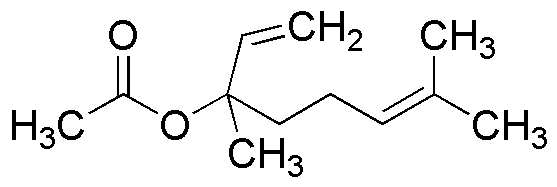Linalyl acetate is widely utilized in research focused on:
- Fragrance Industry: This compound is a key ingredient in perfumes and cosmetics, providing a fresh, floral scent. Its pleasant aroma makes it a popular choice for creating appealing fragrances in personal care products.
- Flavoring Agent: In the food industry, linalyl acetate is used as a flavoring agent in various products, including beverages and confections. Its fruity flavor profile enhances the taste experience for consumers.
- Pharmaceutical Applications: This compound has potential therapeutic properties, making it useful in the development of natural remedies and essential oils. It can be incorporated into formulations aimed at promoting relaxation and reducing stress.
- Aromatherapy: Linalyl acetate is commonly found in essential oils used for aromatherapy. Its calming effects can help improve mood and promote a sense of well-being, making it a favorite among wellness practitioners.
- Insect Repellent Formulations: Due to its natural properties, linalyl acetate is used in some insect repellent products. It offers a safer alternative to synthetic chemicals, appealing to consumers looking for eco-friendly solutions.
General Information
Properties
Safety and Regulations
Applications
Linalyl acetate is widely utilized in research focused on:
- Fragrance Industry: This compound is a key ingredient in perfumes and cosmetics, providing a fresh, floral scent. Its pleasant aroma makes it a popular choice for creating appealing fragrances in personal care products.
- Flavoring Agent: In the food industry, linalyl acetate is used as a flavoring agent in various products, including beverages and confections. Its fruity flavor profile enhances the taste experience for consumers.
- Pharmaceutical Applications: This compound has potential therapeutic properties, making it useful in the development of natural remedies and essential oils. It can be incorporated into formulations aimed at promoting relaxation and reducing stress.
- Aromatherapy: Linalyl acetate is commonly found in essential oils used for aromatherapy. Its calming effects can help improve mood and promote a sense of well-being, making it a favorite among wellness practitioners.
- Insect Repellent Formulations: Due to its natural properties, linalyl acetate is used in some insect repellent products. It offers a safer alternative to synthetic chemicals, appealing to consumers looking for eco-friendly solutions.
Documents
Safety Data Sheets (SDS)
The SDS provides comprehensive safety information on handling, storage, and disposal of the product.
Product Specification (PS)
The PS provides a comprehensive breakdown of the product’s properties, including chemical composition, physical state, purity, and storage requirements. It also details acceptable quality ranges and the product's intended applications.
Certificates of Analysis (COA)
Search for Certificates of Analysis (COA) by entering the products Lot Number. Lot and Batch Numbers can be found on a product’s label following the words ‘Lot’ or ‘Batch’.
*Catalog Number
*Lot Number
Certificates Of Origin (COO)
This COO confirms the country where the product was manufactured, and also details the materials and components used in it and whether it is derived from natural, synthetic, or other specific sources. This certificate may be required for customs, trade, and regulatory compliance.
*Catalog Number
*Lot Number
Safety Data Sheets (SDS)
The SDS provides comprehensive safety information on handling, storage, and disposal of the product.
DownloadProduct Specification (PS)
The PS provides a comprehensive breakdown of the product’s properties, including chemical composition, physical state, purity, and storage requirements. It also details acceptable quality ranges and the product's intended applications.
DownloadCertificates of Analysis (COA)
Search for Certificates of Analysis (COA) by entering the products Lot Number. Lot and Batch Numbers can be found on a product’s label following the words ‘Lot’ or ‘Batch’.
*Catalog Number
*Lot Number
Certificates Of Origin (COO)
This COO confirms the country where the product was manufactured, and also details the materials and components used in it and whether it is derived from natural, synthetic, or other specific sources. This certificate may be required for customs, trade, and regulatory compliance.

